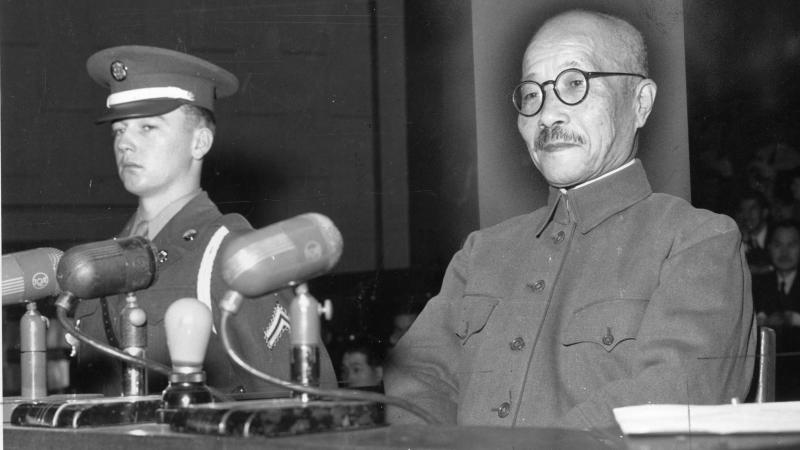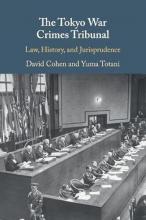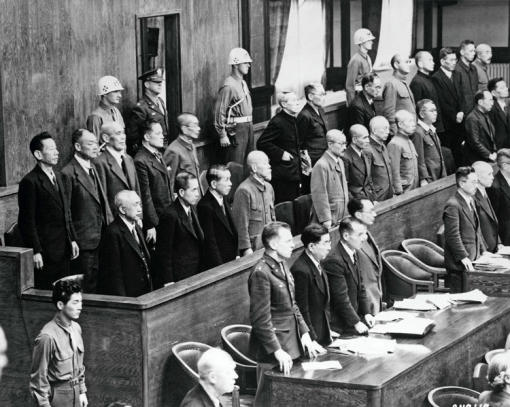Twenty-eight Japanese military and political leaders were charged in the Tokyo Trial with fifty-five separate counts encompassing the waging of aggressive war, murder and conventional war crimes committed against prisoners-of-war, civilian internees and the inhabitants of occupied territories. The defendants included former prime ministers, former foreign ministers and former military commanders. In the course of the proceedings, the court ruled that 45 of the counts, including all the murder charges, were either redundant or not authorized under the IMTFE Charter.
Following months of preparation, the IMTFE convened first on April 29, 1946. The trials were held in the War Ministry office in Tokyo. On May 3 the prosecution opened its case, charging the defendants with crimes against peace, conventional war crimes, and crimes against humanity. The trial continued for more than two and a half years, hearing testimony from 419 witnesses and admitting 4,336 exhibits of evidence, including depositions and written statements from 779 other individuals.
Following the model used at the Nuremberg trials in Germany, the Allies established three broad categories. "Class A" charges, alleging crimes against peace, were to be brought against Japan's top leaders who had planned and directed the war. Class B and C charges, which could be leveled at Japanese of any rank, covered conventional war crimes and crimes against humanity, respectively. Unlike the Nuremberg trials, the charge of crimes against peace was a prerequisite to prosecution - only those individuals whose crimes included crimes against peace could be prosecuted by the Tribunal.
Sentencing
After the defense had finished its presentation on September 9, 1947 the IMT spent fifteen months reaching judgment and drafting its 1,781-page opinion. The reading of the judgment and the sentences lasted from December 4 to 12, 1948. Five of the eleven justices released separate opinions outside the court.
One defendant, Shūmei Ōkawa, was found mentally unfit for trial and the charges were dropped. Two defendants, Yōsuke Matsuoka and Osami Nagano, died of natural causes during the trial. Six defendants were sentenced to death by hanging for war crimes, crimes against humanity, and crimes against peace (Class A, Class B and Class C): General Kenji Doihara, chief of the intelligence services in Manchukuo, Kōki Hirota, prime minister (later foreign minister), General Seishirō Itagaki, war minister, General Heitarō Kimura, commander, Burma Area Army, Lieutenant General Akira Mutō, chief of staff, 14th Area Army, General Hideki Tōjō, commander, Kwantung Army (later prime minister). One defendant was sentenced to death by hanging for war crimes and crimes against humanity (Class B and Class C): General Iwane Matsui, commander, Shanghai Expeditionary Force and Central China Area Army. They were executed at Sugamo Prison in Ikebukuro on December 23, 1948. MacArthur, afraid of embarrassing and antagonizing the Japanese people, defied the wishes of President Truman and barred photography of any kind, instead bringing in four members of the Allied Council to act as official witnesses.
Sixteen defendants were sentenced to life imprisonment. Three (Koiso, Shiratori, and Umezu) died in prison, while the other thirteen were paroled between 1954 and 1956. Foreign minister Shigenori Tōgō was sentenced to 20 years' imprisonment. Togo died in prison in 1949. Foreign minister Mamoru Shigemitsu was sentenced to 7 years. He later served as Foreign Minister and as Deputy Prime Minister of post-war Japan.
Research Guide
This Research Guide is intended as a starting point for research on the Tokyo Trial. It provides the basic legal materials available in the Peace Palace Library, both in print and electronic format. Handbooks, leading articles, bibliographies, periodicals, serial publications and documents of interest are presented in the Selective Bibliography section. Links to the PPL Catalogue are inserted. The Library's subject heading (keyword) International Military Tribunal for the Far East is instrumental for searching through the Catalogue. Special attention is given to our subscriptions on databases, e-journals, e-books and other electronic resources. Finally, this Research Guide features links to relevant websites and other online resources of particular interest.
Need some help? Visit Start Your Research for a basic introduction to international legal research in the Peace Palace Library. Your road map for approaching an international legal research problem in 11 steps.
Sources
A single volume containing the essentials: the Tribunal’s founding documents, the Indictment, and the judgments. The authors’ introduction sets out the main features of the trial, with a strong emphasis on the legal issues: the validity of the charges, the problems with “common plan or conspiracy,” and the imprecision of the rules of evidence, plus incisive appraisals of the personalities involved.
A functional index of the Proceedings of the International Military Tribunal for the Far East to enable researchers to find their way through some fifty thousand pages of subject material.
The full text of the dissentient judgment of Mr. Justice Radha Binod Pal of India in the case of the United States of America and other Allied Powers versus Araki Sadoa and Others, tried by the International Military Tribunal for the Far East.
This 124-volume series is the most important primary source on the Tokyo Tribunal, encompassing its founding documents, the Indictment, transcripts, the judgments, and appeals and reviews. It also provides supplementary documents, such as International Prosecution Section committee minutes, decisions, and memoranda. Most volumes contain Pritchard’s illuminating introductory overview, and a grid setting out the phases of the trial. The only drawback: no index (see instead Pritchard and Zaide 1981–1987).
The complete transcripts of the Proceedings of the International Military Tribunal for the Far East in twenty-two volumes. Index and Guide, I-V.
Vol. 1 (1946) - vol. 198 (1948). And: Proceedings in chambers; Motions; Motions to dismiss defendants; Judgment of Justice Pal, member of India; Opinion of Justice Röling, member to the Netherlands; Concurring opinion by Justice Delfin Jaranilla, member for the Republic of the Philippines; Separate opinion of the President William F. Webb; Dissenting judgment of the member from France Justice Henri Bernard; Index of witness: Prosecution and defense; Index of motions, arguments ... [etc.]
- Röling, B.V.A. and C.F. Rüter (eds.), The Tokyo Judgment: the International Military Tribunal for the Far East (I.M.T.F.E), 29 april 1946 - 12 november 1948, Amsterdam, APA-University Press Amsterdam, 1977.
- Vol. 2, Judgement of the member from India. Opinion of the member from the Netherlands.
Reference works
- Boister, N. and R. Cryer, The Tokyo International Military Tribunal: A Reappraisal, New York, Oxford University Press, 2008.
- Cheng, Z., History of War Crimes Trials in Post 1945 Asia Pacific, Singapore, Palgrave Macmillan, 2019.
- Cohen, D. and Y. Totani, The Tokyo War Crimes Tribunal: Law, History, and Jurisprudence, Cambridge; New York, Cambridge University Press, 2018.
This book contains interesting information about the various editions of the records of the Tokyo Trial, see pages xii - xiv. References about archives, online sources, published primary sources (microfilms, book formats) and secondary literature can to be found on pages 523 - 533.
- Hosoya, C., N. Ando, Y. Onuma and R. Minear (eds.), The Tokyo War Crimes Trial: an International Symposium, Tokyo; New York, Kodansha International Ltd., 1986.
- Maga, T., Judgment at Tokyo: the Japanese War Crimes Trials, Lexington, University Press of Kentucky, 2001.
- Mei, R., The Tokyo Trial and War Crimes in Asia, Singapore, Palgrave Macmillan, 2018.
- Minear, R.H., Victors' Justice: the Tokyo War Crimes Trial, Ann Arbor, Center for Japanese Studies, University of Michigan, 2001.
- Röling, B.V.A. and A. Cassese, The Tokyo Trial and Beyond: Reflections of a Peacemonger, Cambridge, Polity Press, 1993.
- Tanaka, Y., T. McCormack and G. Simpson (eds.), Beyond Victor's Justice?: The Tokyo War Crimes Trial Revisited, Leiden, Nijhoff, 2011.
- Wieviorka, A. (dir.), Les procès de Nuremberg et de Tokyo, Bruxelles, Editions Complexe, 1996.
Selected books and articles
- Babovic, A., The Tokyo Trial, Justice, and the Postwar International Order, Singapore, Palgrave Macmillan, 2019.
- Bass, Gary Jonathan. Judgement at Tokyo : World War II on Trial and the Making of Modern Asia. Picador, an imprint of Pan Macmillan, 2023.
- Brackman, A.C., The Other Nuremberg: the Untold Story of the Tokyo War Crimes Trials, New York, Morrow, 1987.
- Futamura, M., War Crimes Tribunals and Transitional Justice: the Tokyo Trial and the Nuremburg Legacy, London, Routledge, 2008.
- Kei, U., Beyond the "Judgment of civilization": The Intellectual Legacy of the Japanese War Crimes Trials, 1946-1949, Tokyo, International House of Japan, 2003.
- Lingen, K. von (ed.), Transcultural Justice at the Tokyo Tribunal: the Allied Struggle for Justice, 1946-48, Leiden; Boston, Brill, 2018.
- Liu, D. and B. Zhang (eds.), Historical War Crimes Trials in Asia, Brussels, Torkel Opsahl Academic EPublisher, 2016.
- Li, P., Japanese War Crimes: The Search for Justice, New Brunswick, Transaction Publishers, 2003.
- Mitchell, R.H., The Historical and Political Context of the Tokyo War Crimes Trial: Assassination and Terrorism in Japan and the Transformation of Japan's International Image, Lewiston, The Edwin Mellen Press, 2014.
- Nakazato, N., Neonationalist Mythology in Postwar Japan: Pal's Dissenting Judgment at the Tokyo War Crimes Tribunal, Lanham, Lexington Books, 2016.
- Ōoka, Yūichirō. Le Procès de Tokyo: Le Plaidoyer du Juge Français pour L’innocence., Translated by Paul de Lacvivier, Éditions du Drapeau blanc, 2023.
- Piccigallo, P.R., The Japanese on Trial: Allied War Crimes Operations in the East, 1945-1951, Austin, University of Texas Press, 1979.
- Sellars, K., 'Crimes against Peace" and International Law, Cambridge, Cambridge University Press, 2013.
- Sellars, K. (ed.), Trials for International Crimes in Asia, Cambridge, Cambridge University Press, 2016.
- Takeda, K., Interpreting the Tokyo War Crimes Trial: A Sociopolitical Analysis, Ottowa, University of Ottawa Press, 2010.
- Tanaka, Y., Hidden Horrors: Japanese War Crimes in World War II, Boulder, Westview Press, 1996.
- Tokyo Trial Research Centre (ed.), The Tokyo Trial: Recollections and Perspectives from China, New York, Cambridge University Press, 2016.
- Totani, Y., Justice in Asia and the Pacific Region, 1945-1952: Allied War Crimes Prosecutions, New York, Cambridge University Press, 2015.
- Totani, Y., The Tokyo War Crimes Trial: the Pursuit of Justice in the Wake of World War II, Cambridge, Harvard University Asia Center, 2008.
- Thurman, M.J. and C.A. Sherman, War Crimes, Japan's World War II Atrocities, Paducah, Turner Publishing Company, 2001.
- Wilson, S., R. Cribb, B. Trefalt and D., Aszkielowicz, Japanese War Criminals: the Politics of Justice after the Second World War, New York, Columbia University Press, 2017.
For all peer-reviewed articles in the PPL Catalogue, click here.
Bibliographies
This work is a book-length annotated bibliography of English-language sources on the International Military Tribunal for the Far East. It is also an annotated bibliography on other war crimes held in the Asia-Pacific region between 1945 and 1956. It includes entries for official sources (e.g. trial transcripts, international treaties, and national war crimes laws and documents), scholarly sources (monographs and periodicals), memoirs and papers of participants, dissertations and theses, and news magazine accounts.
[Free access] A literature database that covers trial records and evidence presented at the International Military Tribunal for the Far East. It provides access to the entire Tokyo Trial records. The database currently contains documents amounting to 60 million words, 50 million of which are in English. It also contains 700 pictures and video records totaling 50 minutes, all featuring the trial and key figures involved. The database will be further improved and made available in Chinese, English and Japanese.
[PPL access] Peer-reviewed article International Military Tribunals by Johannes Fuchs and Flavia Lattanzi on both the International Military Tribunal (IMT/Nuremberg Trial) and the International Military Tribunal for the Far East (IMTFE/Tokyo Trial). Article last updated: April 2011.
[Free access] This collaborative archive includes digitized IMTFE materials from collections at the University of Virginia Law Library and the Virginia Historical Society. These roughly 7,000 documents consist of personal papers from members of the prosecution and defense sections, official IMTFE records, newspaper clippings, photographs, and other related trial materials.
[Princeton University users only] This is a full text searchable database of documents covering the Tokyo Trials of World War II Japanese war criminals, collected from sources around the world. The database includes transcripts of the proceedings of the International Military Tribunal for the Far East, court exhibits of the International Military Tribunal for the Far East, transcripts of the interrogations by the prosecutors, historical photos, and relevant audio-visual resources. The resources have been classified and indexed with parallel translations in English, Chinese and Japanese. The database includes photographs or copies of original texts from the National Archives of the United States and related material acquired from sources around the world and was compiled by the Center for Tokyo Trial Studies at Shanghai Jiao Tong University.
Archives with vast collections on the Tokyo Trial
Archief Ministerie van Buitenlandse Zaken, The Hague.
Australian War Memorial, Canberra.
Hoover Library and Archives, Stanford University, CA.
Kaiko bunko, Yasukuni Shrine, Tokyo, Japan.
National Archives, Kew, Surrey, Richmond, UK.
National Archives and Records Administration, College Park, MD.
National Archives of Australia, Canberra.
National Archives of the Netherlands, Den Haag.
National Diet Library, Tokyo, Japan.
University of Virginia School of Law Library, VA.


